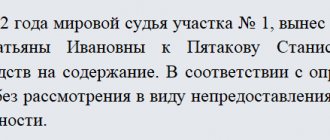When turning to a judicial authority, citizens expect a fair, comprehensive and impartial consideration of a controversial situation or the establishment of a legally significant fact. But it happens that due to insufficiently objective proceedings or the emergence of new circumstances in the case, the court’s decision cannot be called lawful. Such situations are provided for by law.
A party dissatisfied with the outcome of the proceedings has the right to file a complaint against an incorrect court decision, resolution or ruling to the court competent in these matters. But before doing this, it is recommended that you familiarize yourself with the appeal procedure, types of complaints and the hierarchy of authorities in the judicial system of the Russian Federation.
Who can complain
According to the current procedural legislation, all parties and participants in the process, as well as other persons whose legal rights and interests were affected by the contested decision (ruling, resolution), have the right to appeal judicial acts. These include:
- plaintiff (victim, applicant);
- defendant (accused, acquitted);
- private prosecutor;
- representatives of the parties;
- prosecutor (with a motion to review the decision).
Procedure and deadlines for appeal
A complaint against an act issued by a judge is filed taking into account the peculiarities of legal proceedings and the position of the court considering it in the justice system.
Private and appeal
The differences between these complaints lie in the subject matter of the dispute. For a private person, these are court decisions that prevent the further progress of the case, and other judicial actions established by procedural legislation. These include regulations:
- refusal to initiate a criminal case or accept a claim;
- to suspend the consideration of the case;
- on the imposition of a fine for violation of the legal procedure and the procedure for collecting other legal costs;
- on refusal to provide evidence;
- about leaving the complaint (statement, claim) without progress, etc.
This type of complaint is filed before the court makes a final decision - during the proceedings of the first instance.
During the appeal, you can challenge a court decision made at first instance, but not yet entered into force. The procedure for filing them is identical and can be made simultaneously, if the determination does not fall into the category of being appealed separately (preventing a citizen from accessing justice, violating the reasonable time frame for consideration of the case and leaving it without progress).
A private/appeal complaint is sent to the judicial body of the second instance, superior to the court that issued the decision or order. An application for contesting an act adopted by a magistrate is submitted to the court assigned to the district of the settlement where the magistrate exercises his powers. In turn, the ruling of the district court is competent to be considered by the regional or supreme court within the subject, since in the judicial system this authority is the highest in the hierarchy.
The jurisdiction of cases related to the resolution of economic disputes is determined according to a separate scheme. To review them at the second instance, there is a separate court - the arbitration court of appeal. Acts adopted during or at the end of legal proceedings in cases of military personnel are challenged in a district or naval military court.
Decisions and rulings made by the Judicial Collegiums of the Supreme Judicial Body may also be appealed. The powers in these matters are vested in the specialized Board of Appeal of the same Supreme Court. At the same time, an application to appeal a decision/ruling is submitted not to the authority competent to appeal it, but through the court that adopted the unlawful act.
Deadlines
The time limit for filing a private complaint/appeal in civil, administrative cases and economic disputes is 15 days to challenge a determination and 30 days to appeal. For the same actions in criminal proceedings, 10 days are established, regardless of the type of appeal.
The appeal period is calculated from the date of issuance of the contested act and is restored at the request of the interested person if there are compelling reasons for omission. The court's refusal can also be appealed to a higher authority.
Period for consideration of private/appeal complaints by courts in civil, administrative cases and economic disputes (criminal cases):
- district, supreme court of the subject, district (naval) military court - 60 days (15 - district and 30 - supreme);
- RF Armed Forces - 90 days (45).
The period begins to run from the moment the application for challenge is filed. For all cases, except criminal cases, this is the general period for accepting an application, opening proceedings and making a decision. According to the Criminal Procedure Code, the specified period is established only for the beginning of the consideration, and, therefore, the final act can be adopted later.
Cassation
The need for cassation arises when challenging unlawful judicial acts after they have entered into legal force. Cassation proceedings are the third instance and can be opened only as a result of an unsatisfactory appeal for the applicant.
Courts of third instance and cases under their jurisdiction:
- Presidium of the supreme court of the subject, district (naval) military court. They have the right to accept applications to challenge the current decisions of district, military garrison and magistrate judges, appeal rulings of district, district (naval) and supreme courts in the constituent entities.
- District Arbitration Court. Conducts cassation proceedings in relation to acts issued by the arbitration and arbitration courts of appeal.
- Judicial Collegiums of the Supreme Court of the Russian Federation. Competent in matters of challenging the decisions of district (military garrison) courts that have entered into force, appealed in the second instance by the presidium of the supreme judicial body of the subject, as well as appeal rulings of the supreme courts and decisions of their presidiums.
Deadlines
The period of time during which an interested participant in the process has the right to file an application for cassation is established by procedural codes for certain categories of cases:
- for civil and administrative cases - six months from the date of entry into force of the act being appealed;
- for criminal cases - not limited;
- for economic disputes - 2 months.
A deadline missed for a valid reason may be restored on the basis of a petition from an interested person submitted no later than six months from the date of entry into force of the act.
Well, the consideration of the cassation appeal leaves:
- 1 month - when considered by the court of the appropriate instance without the need to reclaim the case;
- 2 months - by the cassation court, if the case is subject to remand, by arbitration, as well as by the Supreme Court of the Russian Federation, without reclamation;
- 3 months - the Armed Forces of the Russian Federation, when the case is requested from the body storing it.
According to paragraph 3 of Art. 382 of the Code of Civil Procedure of the Russian Federation, the period for consideration of particularly complex cassation complaints can be extended by the Chairman of the Supreme Court of the Russian Federation or his deputy for no more than 2 months.
The period allotted for cassation proceedings in civil, criminal and administrative cases begins from the day the complaint is received. The time spent on reclaiming the case is excluded from it.
The district arbitration court considers the start of the period for consideration of the application the moment it is received along with the case, but not earlier than the end of 2 months from the date the appealed decision enters into legal force.
Supervisory
The review of judicial acts that have entered into legal force is carried out by the Presidium of the RF Armed Forces in the manner of supervision.
Supervisory complaints include complaints against decisions and determinations:
- accepted by the supreme court of the subject or the district (naval) military, previously considered in the appellate proceedings of the Armed Forces of the Russian Federation;
- Judicial Collegium for Economic Disputes of the Supreme Court, which passed the appeal;
- RF Supreme Court after appeal;
- Appeal Board of the RF Armed Forces;
- issued as a result of consideration by the Judicial Collegium of the Supreme Court at the second instance;
- considered in third instance by the Judicial Collegium of the Supreme Court.
Deadlines
The supervisory appeal is sent to the Supreme Court of the Russian Federation no later than three months from the moment the appealed decision acquires legal force. This applies to acts in all cases except criminal ones - according to the Code of Criminal Procedure, an application to challenge them is filed without time limits.
A deadline missed due to valid reasons may be restored if the relevant petition is filed by the interested party no later than six months after the issuance of the contested act.
For the review of a judicial act, the Presidium allots 2 months without filing a claim and 3 months with filing a claim (1–2 months according to the Code of Criminal Procedure). At the same time, the Chairman of the RF Supreme Court or his deputy has the right to extend the period for another 2 months if an objective need arises.
Constitutional
The subject of the appeal is a violation of the constitutional rights and freedoms of citizens when resolving a specific case through judicial proceedings.
In other words, if a judicial act was adopted on the basis of a law that runs counter to the provisions of the Constitution of the Russian Federation, it can be challenged in the Constitutional Court of the Russian Federation at the request of an interested person. But this can only be done within one year from the date of adoption of the unconstitutional decision.
Who can complain to the court, reasons for filing complaints
It is possible to apply to the judicial authorities with a claim against any person in order to hold him accountable or an organization as a result of whose actions the rights of an individual or legal entity were violated.
For example, an employee can initiate a case against an unscrupulous employer who has not paid wages for several months or who deceived the employee upon dismissal, and the court will already decide to impose criminal or administrative liability. In addition, in such cases, a collective statement can be submitted from the entire staff of the organization, deceived by the boss. For example, if the boss, in the process of dismissing an employee for health reasons, refused to pay sick leave compensation to the dismissed person, then the employee has the right to file a lawsuit against the employer in the courts. Of course, cases may be related not only to work in the form of violation of the terms of the employment contract. Consumers have the right to appeal to a judge for violations of rights by manufacturers and sellers in the process of selling them a product or service.
Any citizen has the right to file a complaint against a third party. For example, an employer regularly delays wages. In this case, the employee can file a lawsuit to recover money from his superiors. Delaying wages is a reason to complain against the employer. The executor can independently resolve the situation before the trial.
An investigator or prosecutor has the right to send a case for consideration to a regional or city court.
Thus, any persons or organizations whose rights have been violated can participate in legal proceedings.
The reasons for filing an application with the courts depend on what type of complaint is involved in the proceedings. Most often, the decisions of the magistrate are appealed. Familiarization with the minutes takes place directly in the meeting room. There are 4 types of complaints, examples of which are presented in the table:
| Type of complaint | Reason for application | Authority accepting the application | Application deadlines |
| Private (appeal) | This type of litigation is associated with the fact that the plaintiff or defendant wants to appeal a court decision based on the result of the proceedings. In addition, such an application can be filed in cases where the court fails to act, for example, if the victim has been refused a trial. An appeal occurs when the consideration of the case is suspended or remains without progress. | superior court of second instance | 15 days to challenge the decision; 30 days to file an appeal |
| Cassation | such a complaint is filed in the event of the entry into force of judicial acts that are unlawful | higher courts of third instance, for example, the Supreme Court of the subject, the district arbitration court, the collegium of the Supreme Court of the Russian Federation, the Chairman of the Supreme Court of the Russian Federation | 6 months for proceedings in administrative and civil cases. 2 months for consideration of economic disputes. For criminal cases, the deadline for filing a cassation appeal is not limited by Russian legislation |
| Supervisory | Represents a review of decisions adopted by the subject's Supreme Court or military court, as well as collegiums of the RF Armed Forces | Presidium of the Supreme Court of the Russian Federation | no more than 3 months from the date of receipt of the court decision, with the decision of which the plaintiff does not agree |
| Constitutional | The reason for filing this type of application is a violation of the constitutional rights and freedoms of man and citizen, which occurred during the trial. That is, if a court ruling was made on the basis of a law that contradicts the norms of constitutional law, then it must be challenged (one cannot remain inactive) | Constitutional Court of the Russian Federation | 1 year from the date of the judge’s decision |

Important! The appeal must be filed before the court makes a final decision, that is, during the proceedings, at the preliminary stage of the magistrate's decision. If the plaintiff, for good reasons, was unable to appeal to the higher court in a timely manner, then the missed deadline can be restored with the help of a corresponding petition from the victim or persons representing him.
Content
The Code of Criminal Procedure, Civil Procedure Code, Arbitration Procedure Code and CAS of the Russian Federation agree in determining the content of complaints. They should include the following information:
- The name of the court accepting the application for consideration.
- Full name and address of the parties to the process.
- Subject and title, for example, “Appeal against the decision of the Judicial Collegium for Administrative Cases of the Supreme Court of the Russian Federation” (written in the middle of the line, immediately below the introductory part).
- Number, date of the act being appealed and the full name of the body that issued it.
- Grounds for challenge.
- The applicant's claims and legal provisions supporting their legality.
- List of applications.
The application must be accompanied by:
- a copy of the appealed decision;
- receipt of payment of state duty (request for installment plan or deferred payment, document confirming the benefit);
- paper indicating receipt of a copy of the complaint and missing documents by the remaining participants in the trial (mail notification of delivery, receipt);
- an act confirming the authority to sign the complaint.
General rules for drawing up and filing complaints
Any of the complaints requires careful attention to the literacy and coherence of the text. Insults and profanity are not acceptable. An anonymous complaint will not be accepted for consideration.
As attachments to complaints, it is necessary to provide both copies of the disputed documents and all documentation confirming the correctness of the applicant and the legality of his claims.
If difficulties arise in filling out complaints or in the process of collecting evidence, the best solution would be to contact a lawyer. They will not only advise you on how to write a complaint correctly, but will also help you draw it up or fill out the available forms.
How to submit
An application for review of a case to the Federal Courts of General Jurisdiction and the Federal Arbitration Instances is submitted in writing in person to the reception office of the authority or by registered mail. All necessary contact information and work schedules can be found on the official websites of the courts. A complete list of them with links is provided at the following email address:
- https://sudrf.ru/index.php?id=300 (search engine for Federal Courts of General Jurisdiction);
- https://arbitr.ru - portal of arbitration authorities.
There are two ways to send a complaint to the Supreme Court of the Russian Federation:
- By mail to the address - st. Povarskaya st., 15, Moscow, 121260.
- Through the Reception BC - st. Povarskaya, 13 Moscow (Monday–Thursday - from 9:00 to 18:00, Friday - until 16:30, break - from 13:00 to 13:35).
The Constitutional Court accepts applications:
- By mail to the address: 190000, St. Petersburg, Senate Square, building 1.
- Personally from the applicant - St. Petersburg, st. Galernaya, building 1 (on weekdays from 10:00 to 17:00, on Fridays and holidays until 16:00, break from 12:00 to 13:00).
- To an electronic mailbox (if you have an enhanced qualification electronic seal - CEP).
- Through the official website - https://petition.ksrf.ru (registration is required with the obligatory attachment of a digital copy of the passport).
Filing a complaint must be preceded by payment of the state fee: for an appeal or cassation - 150 rubles, supervisory - 300 rubles. (in arbitration proceedings - 3,000 rubles and 6,000 rubles, respectively), constitutional - 450 rubles.
How to draw up a statement of claim to court - sample
The application is sent in writing or electronically. You can write it either by hand or using office equipment. In the upper right part of the claim you must indicate:
- Name of the judicial authority to which the document is addressed
- Full name or name of organization with its address
- Full name of the administrative defendant, his address
- You can also add your phone number and email
In the text of the claim itself, indicate how your rights have been violated or what the threat of their violation is. Note the details that you can rely on to make your demands. Provide evidence of your position and demands.
If the claim requires assessment or compensation for some damage, provide the cost of the claim and its calculation. Also refer to your actual attempts to resolve the dispute pre-trial with documentary evidence of your actions.
Attach to the claim copies of supporting documents that are mentioned in the claim or those that are relevant to the study of the case. Also, calculation of the amount to be recovered, if required by the claim.
The legislative framework
Current legislation on drawing up and filing complaints in court:
- FKZ “On Arbitration Courts in the Russian Federation” dated April 28, 1995 N 1-FKZ.
- “Tax Code of the Russian Federation” dated July 31, 1998 N 146-FZ.
- FKZ “On the Constitutional Court of the Russian Federation” dated July 21, 1994 N 1-FKZ.
- “Code of Administrative Proceedings of the Russian Federation” dated 03/08/2015 N 21-FZ.
- “Arbitration Procedural Code of the Russian Federation” dated July 24, 2002 N 95-FZ.
- “Civil Procedure Code of the Russian Federation” dated November 14, 2002 N 138-FZ.
- “Criminal Procedure Code of the Russian Federation” dated December 18, 2001 N 174-FZ.
Competently drafting a complaint to the court is important for its further consideration. Our specialists will help you do this in accordance with the rules and requirements of the law, taking into account all the legal subtleties. If necessary, experienced lawyers will advise on other issues.










